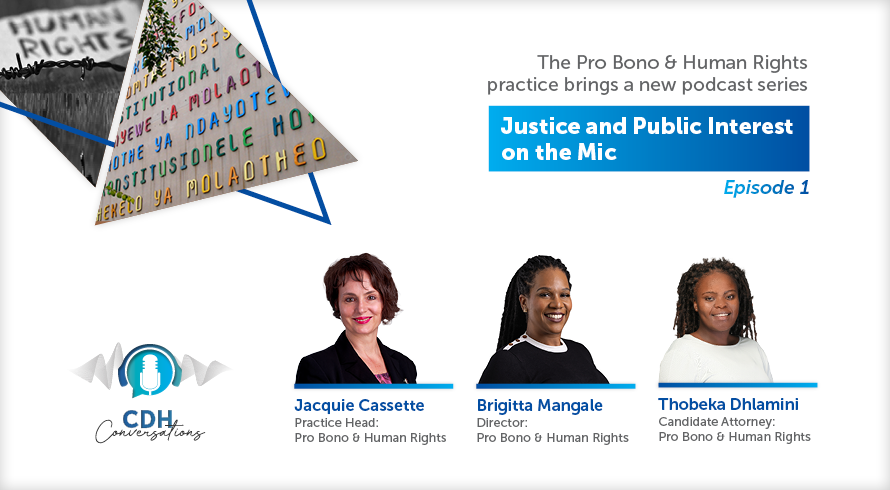Constitutional Court grants life-long anonymity for children in criminal proceedings
The widespread story of Zephany Nurse set the course of this case in motion. Zephany Nurse was abducted at birth from her biological parents in the maternity ward in a Cape Town hospital. When she was 17 years old, she found out her true identity and that the woman who had raised her was in fact her abductor, which led to the abductor being prosecuted. The trial was to commence after Zephany turned 18, which naturally attracted a lot of media attention. In fear of her true identity being exposed, she approached CCL which launched an urgent interim application to interdict the media from releasing her identity (the interdict was granted), pending the finalisation of the below-mentioned proceedings.
Section 154(3) of the CPA prohibits the media from publishing any information, which reveals or may reveal the identity of an accused or a witness at or in criminal proceedings if they are under the age of 18, unless the court orders that the publication would be just and equitable. Any violation of this section carries with it a criminal sanction of imprisonment of up to five years or a fine or both. This section, however, does not provide the same protection for victims in criminal proceedings.
CCL sought a declaration from the High Court that section 154(3) of the Criminal Procedure Act, when properly interpreted, protects the anonymity of child victims of crime, and not only witnesses and accused at criminal proceedings (victim extension). Alternatively, they sought a declaration that section 154(3) was constitutionally invalid for failing to provide for that protection.
CCL further sought a declaration that the protection in section 154(3) should extend beyond adulthood and protect the identity of child accused, witnesses and victims after they turn 18 (ongoing protection). Alternatively, CCL argued that if section 154(3) could not be interpreted in such a way, that the section was constitutionally invalid. The media respondents opposed the application.
High Court
The High Court held that the wording of section 154(3), could be purposively interpreted to extend to child victims in criminal proceedings. However, the High Court held that section 154(3) should not be interpreted to provide ongoing protection to child participants in criminal proceedings once they turn 18 years of age.
Supreme Court of Appeal
The CCL appealed this decision in the Supreme Court of Appeal (SCA), and the SCA held that section 154(3) was only unconstitutional insofar as it did not protect child victims at criminal proceedings. Furthermore, the SCA refused to extend the publication ban on identities of accused, witnesses and/or victims beyond the age of 18 as it was “overbroad” and would infringe upon the open justice principle and severely restrict the right of media to impart information.
Constitutional Court
The SCA decision, led to the application before the Constitutional Court. Firstly, an application was made by the Centre for Child Law (CCL), for confirmation of part of an order handed down by the Supreme Court of Appeal declaring section 154(3) to be constitutionally invalid to the extent that the provision does not provide protection for child victims in criminal proceedings. Further, the CCL appealed against the second part of the SCA judgment which held that section 154(3) is constitutionally valid even though it does not ensure protection of anonymity of child accused persons, victims and witnesses, once they reach adulthood. The CCL argued that the default position should be that of anonymity and that it would be permissible for the media to approach the court for an order uplifting the publication ban on the child participant’s identity.
CCL argued that the current section 154(3) provisions fail to protect the identity of child victims, it breaches the paramount principle of the best interest of the child and infringes upon children’s rights to dignity and privacy.
The media respondents argued that the relief sought by CCL is constitutionally impermissible as the relief conflicts with the right to freedom of expression and the principle of open justice. The statutory exceptions to the open justice principle sufficiently provide identity protection to children on a case by case basis.
The Constitutional Court held that the overarching purpose of section 154(3) of the CPA is child protection, more specifically, protection from the potentially harmful effects of publication of their names and identities as a result of being implicated in criminal proceedings.
Child victim extension
The Constitutional Court held that because only child accused and child witnesses at criminal proceedings were protected from their identities being published and there is no similar protection for child victims, there was a clear lacuna in the law. The Constitutional Court further held that the exclusion of child victims in section 154(3) limited the right to equality, as it amounted to an arbitrary differentiation – child victims were not offered equal protection and benefit of the law. Furthermore, this lacuna in section 154(3) ran contrary to the best interest of children and their rights to privacy and dignity. Therefore, the court confirmed the declaration of invalidity.
Ongoing protection
In respect of the issue of ongoing protection, the majority held that the best interest of the child principle coalesced with the rights to dignity and privacy, to warrant ongoing protection for child participants into adulthood. The majority highlighted that the fear and harm of identification to which child participants are exposed while they are still children, directly impacts their best interests, which would render the initial protection granted in terms of section 154(3) futile. The Constitutional Court held that:
“If the status quo causes harm to children by exposing them to the criminal justice system, in whatever shape or form, it appears to fail to protect those who are genuinely in need of its protection. It is correct, not all children suffer the same harm and not all children will need ongoing protection. The default position of ongoing protection is to ensure that the best interests of some of the most vulnerable members of our society are given the protection they are entitled to. If the section fails to afford this, the protection would be rendered hollow.”
The court held that there are different but warranted justifications for ongoing protection afforded to child victims, witnesses and accused. The ongoing protection for a child accused can give effect to the worthy objectives of restorative justice. For child victims, the court held that the publicity around child victimisation heightens a child’s risk of experiencing shame and stigma of being “blameworthy and lesser” and the ongoing protection rule would prevent that.
Although the Constitutional Court endorsed the open justice principle and the importance of freedom of expression, it held that the default position of offering the child participants ongoing protection did not result in a severe encroachment on media freedom. The court emphasised that there is a distinction between public interest and what is interesting to the public.
The Constitutional Court declared section 154(3) invalid and ordered an interim reading-in which entails that a person who is subject to the protection of the section does not forfeit the protections upon reaching adulthood, but is entitled to consent to the publication of their identity after reaching adulthood, or if consent is refused, a competent court may be approach by the media to request an upliftment of the publication ban.
The effect of this judgment is the following:
- No one may publish information identifying child victims (in addition to witnesses or accused) at or in criminal proceedings, unless the court is approached for an order permitting the publication of such information;
- This protection is not forfeited when child victims, witnesses or accused, who enjoys the above protection, turn 18 and the protection against their identity being published will be continuous, unless they consent to being identified or a court determined that publication of such information should be allowed.
Due to the fact that this judgment is limited to protection of child victims “at or in criminal proceedings”, the position is unclear whether the media may publish a child victim’s identity prior to criminal proceedings commencing. However, the Constitutional Court emphasised that section 154(3) is to be construed purposively and constitutionally and that this section “must be understood to secure the best interests of children involved in criminal proceedings and protect their privacy and dignity.” As long as persons publishing information are guided by this principle, they should not fall foul of the amendment to section 154(3). Where uncertainty exists on whether or not a child should enjoy the anonymity protection before criminal proceedings commence, the seriousness of the crime and potential impact on children involved would in most cases dictate whether information identifying children can be published.
The information and material published on this website is provided for general purposes only and does not constitute legal advice. We make every effort to ensure that the content is updated regularly and to offer the most current and accurate information. Please consult one of our lawyers on any specific legal problem or matter. We accept no responsibility for any loss or damage, whether direct or consequential, which may arise from reliance on the information contained in these pages. Please refer to our full terms and conditions. Copyright © 2024 Cliffe Dekker Hofmeyr. All rights reserved. For permission to reproduce an article or publication, please contact us cliffedekkerhofmeyr@cdhlegal.com.
Subscribe
We support our clients’ strategic and operational needs by offering innovative, integrated and high quality thought leadership. To stay up to date on the latest legal developments that may potentially impact your business, subscribe to our alerts, seminar and webinar invitations.
Subscribe




